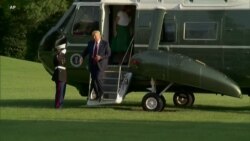ປະທານາທິບໍດີ ດໍໂນລ ທຣຳ ໄດ້ລົ້ມເລີກການຕໍ່ສູ້ຂອງທ່ານກັບລັດຖະສະພາ ກ່ຽວກັບ
ການຕັດສິນເງິນ 4 ຕື້ໂດລາ ໃນການຊ່ວຍເຫຼືອຕ່າງປະເທດ ແລະ ຈະອະນຸຍາດໃຫ້ທຶນ
ທີ່ໄດ້ຈັດອອກໄປແລ້ວຖືກໃຊ້. ແຕ່ກະຊວງການຕ່າງປະເທດກ່າວວ່າ ເຂົາເຈົ້າເຫັນດີ
ກັບທຳນຽບຂາວ ທີ່ຈະ “ລະງັບເງິນທຶນທຸກຢ່າງທີ່ບໍ່ໄດ້ໄປສະໜັບສະໜູນບູລິມະສິດສູງ
ຂອງພວກເຮົາໂດຍກົງ.” ນັກຂ່າວການທູດ ວີໂອເອ ຊິນດີ ເຊນ ມີລາຍງານຈາກນະ
ຄອນຫຼວງ ວໍຊິງຕັນ, ເຊິ່ງ ພຸດທະສອນ ຈະນຳລາຍລະອຽດມາສະເໜີທ່ານໃນອັນດັບຕໍ່
ໄປ.
ປະທານາທິບໍດີ ທຣຳ ໄດ້ສະແດງຄວາມສົງໄສ ກ່ຽວກັບ ການຊ່ວຍເຫຼືອຕ່າງປະເທດ
ຂອງ ສະຫະລັດ, ໂດຍ ເອີ້ນມັນວ່າຟຸມເຟືອຍ ແລະ ບໍ່ຈຳເປັນ ແລະ ໄດ້ພິຈາລະນາສະ
ເໜີຢຸດການໃຫ້ທຶນເຂົາເຈົ້າ.
ປະທານາທິບໍດີ ດໍໂນລ ທຣຳ ໄດ້ກ່າວວ່າ “ພວກເຮົາໄດ້ເອົາເງິນຫຼາຍພັນລ້ານໂດລາ
ໃຫ້ປະເທດທີ່ບໍ່ມັກພວກເຮົາ. ບໍ່ມັກພວກເຮົາແມ່ນແຕ່ໜ້ອຍດຽວ. ແລະ ຂ້າພະເຈົ້າ
ຢາກຕັດມັນ.”
ແຕ່ຫຼັງຈາກບັນດາສະມາຊິກສະພາສັງກັດພັກເດໂມແຄຣັດ ແລະ ຣີພັບບລີກັນ ໄດ້ຄັດ
ຄ້ານຕໍ່ຄວາມພະຍາຍາມຂອງທຳນຽບຂາວນັ້ນ, ລັດຖະບານທ່ານ ທຣຳ ກໍໄດ້ລົ້ມເລີກ
ຄວາມພະຍາຍາມ.
ຜູ້ຊ່ຽວຊານບາງຄົນໄດ້ເຫັນພ້ອມກັບທ່ານປະທານາທິບໍດີວ່າ ທຶນຊ່ວຍເຫຼືອຂອງ ສະ
ຫະລັດ ທີ່ຖືກມອບໃຫ້ອົງການຈັດຕັ້ງສາກົນ ແລະ ຕ່າງປະເທດນັ້ນແມ່ນບໍ່ໄດ້ມີການ
ໃຊ້ຢ່າງຖືກຕ້ອງ. ແຕ່ເຂົາເຈົ້າໄດ້ຄັດຄ້ານທີ່ຈະສະເໜີ ການຕັດທັງຫມົດໂດຍບໍ່ມີເຫດ
ຜົນ.
ທ່ານ ເບຣັດ ຊີເຟີ, ຈາກອົງການ ເຮີຣີເທຈ໌ ຟຣີດອມ (Heritage Freedom) ໄດ້ກ່າວ
ວ່າ “ແຕ່ຖ້າເຂົາເຈົ້າຫວັງຢາກໃຫ້ເງິນຖືກໃຊ້ໃນທາງທີ່ດີກວ່າເກົ່າ ແລະ ກຳນົດທຶນ
ໃໝ່ໃນອະນາຄົດນັ້ນ, ເຂົາເຈົ້າຕ້ອງໃຫ້ເຫດຜົນ, ອັນທີ່ໜ້າເຊື່ອຖືຕໍ່ທັງກະຊວງການ
ຕ່າງປະເທດ ແລະ ອົງການ USAID, ພ້ອມກັບບັນດາສະມາຊິກຂອງລັດຖະສະພາ.”
ຜູ້ຊ່ຽວຊານຄົນອື່ນ ແລະ ອົງການພັດທະນາສາກົນ ກໍໄດ້ຍິນດີກັບການຕັດສິນໃຈທີ່
ຈະລົ້ມເລີກການຕັດທຶນນັ້ນ ເປັນໄຊຊະນະຄັ້ງໃຫຍ່.
ທ່ານນາງ ໂພລາ ກາເຊຍ ທູໂຟຣ ຈາກສະພາແອັດແລນຕິກ ກ່າວວ່າ “ມັນເປັນໄຊຊະ
ນະຄັ້ງໃຫຍ່ສຳລັບ ສະຫະລັດ ແລະ ຜົນປະໂຫຍດຂອງເຂົາເຈົ້າ, ໃນຂະນະທີ່ຂ້າພະ
ເຈົ້າຄິດວ່າ ມັນເປັນຄວາມພະຍາຍາມທີ່ບໍ່ມີຄວາມລະມັດລະວັງ ເພື່ອເອົາການຊ່ວຍ
ເຫຼືອຕ່າງປະເທດມາເປັນເລື່ອງການເມືອງ, ທ່ານຮູ້ບໍ່, ເລີກໃສ່ການຊ່ວຍເຫຼືອ ຫຼື ທ່ານ
ຮູ້ບໍ່, ໂດຍອະທິບາຍວ່າເປັນຄວາມພະຍາຍາມທີ່ຈະຫຼຸດຜ່ອນການຂາດດຸນ, ເມື່ອແທ້
ຈິງແລ້ວ, ການຊ່ວຍເຫຼືອຕ່າງປະເທດແມ່ນຕ່ຳກວ່າ 1 ເປີເຊັນຂອງງົບປະມານລັດຖະ
ບານກາງ.”
ລັດຖະມົນຕີການຕ່າງປະເທດ ທ່ານ ໄມຄ໌ ພອມພຽວ ໄດ້ເຫັນດີຢ່າງໜັກແໜ້ນກັບ
ທ່ານປະທານາທິບໍດີ ຢ່າງເປີດເຜີຍວ່າ ເງິນທຸກໆໂດລາຂອງຜູ້ຈ່າຍພາສີ ສະຫະລັດ
ຕ້ອງຖືກໃຊ້ຢ່າງລະມັດລະວັງ ເພື່ອປະຕິບັດຕາມບູລິມະສິດສູງສຸດຂອງ ສະຫະລັດ.
ແຕ່ຜູ້ນຳບາງຄົນຂອງປະຊາຄົມການພັດທະນາສາກົນກໍໄດ້ຂອບໃຈທ່ານ ພອມພຽວ
ສຳລັບການຕໍ່ສູ້ຢູ່ເບື້ອງຫຼັງໃນການຕັດການຊ່ວຍເຫຼືອຕ່າງປະເທດຄັ້ງໃຫຍ່ນີ້.
ທ່ານນາງ ໂພລາ ກາເຊຍ ໄດ້ກ່າວວ່າ “ແນ່ນອນມັນເປັນກໍລະນີ ແລະ ໃນກໍລະນີຂອງ
ປີກາຍນີ້, ທີ່ລັດຖະມົນຕີ ພອມພຽວ ໄດ້ເປັນຜູ້ສະໜັບສະໜູນທີ່ແຂງແກ່ນສຳລັບການ
ຊ່ວຍເຫຼືອຕ່າງປະເທດ, ມັນຂ້ອນຂ້າງຈະຊັດເຈນ, ເຊັ່ນດຽວກັບບັນດາຜູ້ນຳກອງທັບ
ຜູ້ທີ່ໄດ້ເວົ້າຢ່າງເດັດດ່ຽວປີກາຍນີ້ ໃນການສະໜັບສະໜູນການພັດທະນາຢ່າງຕໍ່ເນື່ອງ
ແລະ ສືບຕໍ່ໃຫ້ທຶນສຳລັບການຊ່ວຍເຫຼືອໃນການພັດທະນາ ດັ່ງກັບເສົາຫຼັກທີ່ສຳຄັນ
ຂອງຄວາມປອດໄພແຫ່ງຊາດຂອງພວກເຮົາ.”
ພາຍໃນການຊີ້ນຳຂອງທ່ານປະທານາທິບໍດີນັ້ນ, ກະຊວງການຕ່າງປະເທດໄດ້ຢຸດ
ການຊ່ວຍເຫຼືອຕ່າງປະເທດ ສຳລັບບັນດາປະເທດສາມຫຼ່ຽມພາກເໜືອໄດ້ແກ່ປະເທດ
ແອລ ຊາລວາດໍ, ກົວເຕມາລາ ແລະ ຮອນດູຣາສ, ໂດຍເວົ້າວ່າ ປະເທດທີ່ວ່ານັ້ນ ບໍ່ໄດ້
ເອົາມາດຕະການທີ່ໜັກແໜ້ນ ທີ່ຈະຫຼຸດຜ່ອນຈຳນວນຜູ້ຍົກຍ້າຍຖິ່ນຖານຜິດກົດໝາຍ
ຈາກການມາເຂດຊາຍແດນ ສະຫະລັດ.
President Donald Trump has abandoned his fight with Congress over slashing $4 billion in foreign aid and will allow the already appropriated funds to be spent. But the State Department says it agreed with the White House to "redirect all funding that does not directly support our priorities." VOA Diplomatic Correspondent Cindy Saine has more from Washington.
President Trump has expressed ambivalence about U.S. foreign aid, calling it wasteful and unnecessary, and considering a proposal to stop funding it.
"We give billions and billions of dollars to countries that don't like us — don't like us even a little bit. And I've been cutting that."
But after both Democratic and Republican lawmakers objected to the White House effort, the Trump administration gave in.
Some experts agree with the president that not all U.S. funding that goes toward international organizations and foreign countries is well spent. But they objected to the proposed across-the-board cuts without justification.
"But if they hope to actually have that money be used better or reallocated in the future, they need to provide a justification, for one that's convincing both to the State Department and to USAID, and also to members of Congress."
Other experts and international development organizations welcomed the decision to abandon the cuts as a big win.
"It's a big win for, frankly, the United States and its own interests, as I think it was a shortsighted effort to politicize foreign assistance, you know, pegged under, under the auspices or, you know, described as an effort to, to reduce the deficit, when in fact, foreign aid represents less than 1 percent of the federal budget."
Secretary of State Mike Pompeo -- in public -- has strongly agreed with the president that every single dollar of U.S. taxpayer money must be spent carefully to reflect U.S. priorities. But some leaders of the international development community have thanked Pompeo for fighting -- behind the scenes -- against major cuts to foreign aid.
"It's certainly the case and was the case last year, that Secretary Pompeo was a strong supporter for foreign assistance, quite frankly, so were the military leaders who spoke forcefully last year in support of continued development, or continued funding for development assistance as a critical pillar to our national security."
Under the president's direction, the State Department has frozen U.S. foreign assistance to the Northern Triangle countries of El Salvador, Guatemala and Honduras, saying those nations are not taking concrete actions to reduce the number of illegal migrants coming to the U.S. border.





